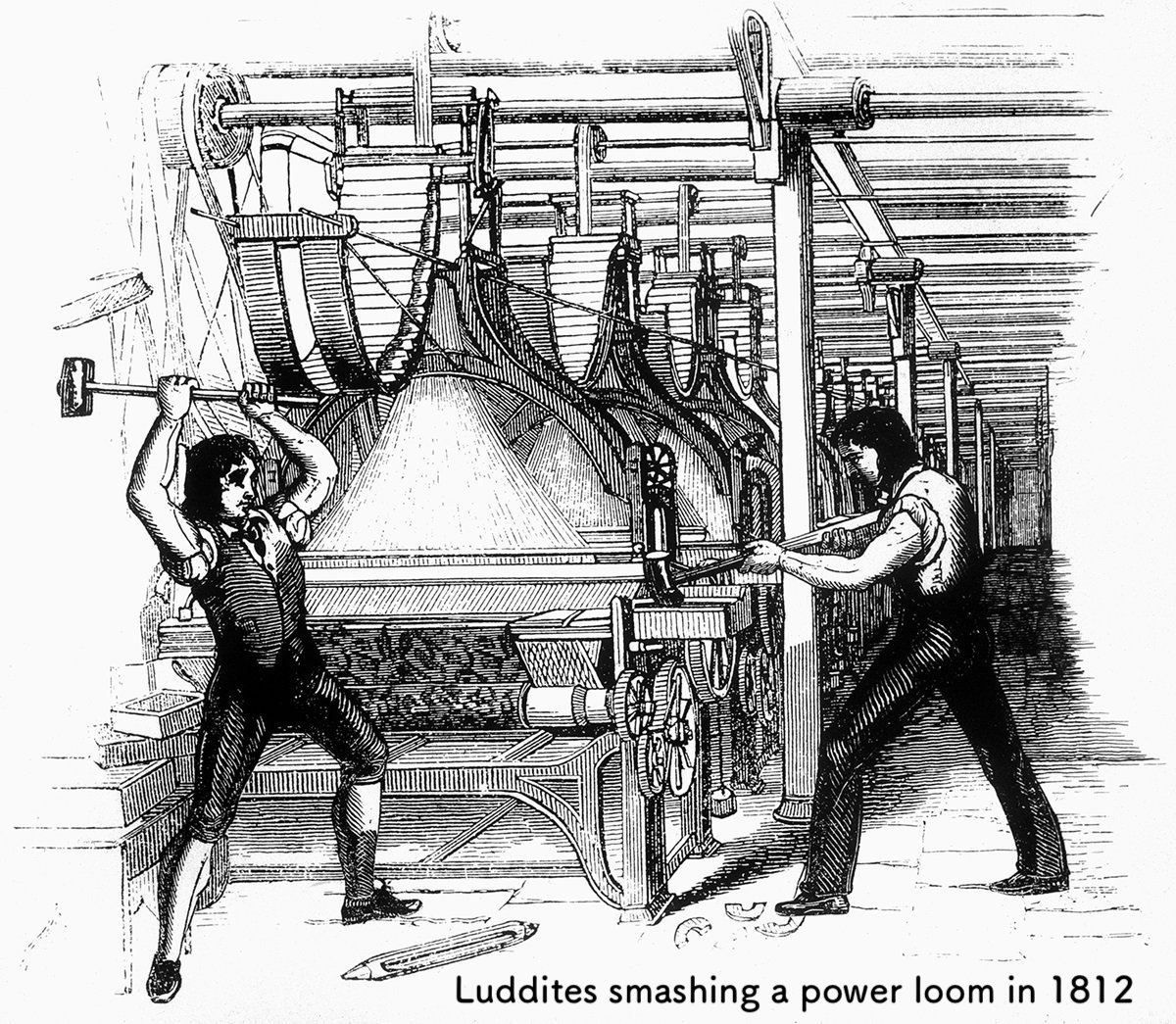デジタル・ラッダイト
Cyber-Luddite or Introducing to Digital
Ludditist

The Cyber Luddite
デジタル・ラッダイト
Cyber-Luddite or Introducing to Digital
Ludditist

The Cyber Luddite
デジタル・ラッダイトとは、別名サイバー・ラッダイトのことである(→「シン・ラッダイト運動」を見よ)。
AIやロボット脅威論の古典は、それらの発達により、労働者の雇用が失われるという恐怖から であった。古くは、ラッダイト運動(Luddite)。 ただし、これは「無知な労働者」たちが、仕事を奪われる恐怖からおこした「原始的な反応」と歴史的には、分がわるい原初的抵抗運動の地位に留まっている。 で も、今日の政府は、Society5.0の到来により、古典的な意味での労働は不要になり、余暇時間が大幅に増えより豊かな社会が到来すると喧伝してい る。もちろん、根拠がない妄想と言えばそれまでだが、誰もが批判し、(抵抗の)声をあげない理由は、日本の労働者の多くは、自らのアイデンティティの多く を労働者というよりも消費者であると位置付けているからであろう(→「若者と労働」P. ウィリス『ハマータウンの野郎ども』Learningto labour : how working class kids get working class jobs)。
だとすれば、21世紀のプレカリアートがおこなうべ
き、最初のリアクションはデジタル・ラッダイト(digital
Luddite)ではないか?またそのような、無益な抵抗の後に必ず生じるのは、デジタル・リボリューションではないのか?-
"Neo-Luddism is a leaderless movement of non-affiliated groups who
resist modern technologies and dictate a return of some or all
technologies to a more primitive level.[Sale, Kirkpatrick, America’s
new Luddites. ] Neo-Luddites are characterized by one or more of the
following practices: passively abandoning the use of technology,
harming those who produce technology harmful to the environment,
advocating simple living, or sabotaging technology. The modern
neo-Luddite movement has connections with the anti-globalization
movement, anti-science movement, anarcho-primitivism, radical
environmentalism, and deep ecology" - Neo-Luddism
ラッダイト,Luddites(ブリタニカの記述) 「産業革命期のイギリスで起こった機械破壊運動。指導者が「キング・ラッド」と呼ばれたところから,この名称が生じた。機械の導入が織物工業の手工業職人 に失業の脅威を与えたため,1811年末ノッティンガムとその周辺で靴下とレースの編み機を破壊して,労賃の低下と安価な機械製品に反対する組織的暴動が 勃発,翌1812年春にかけて中・北部諸州に広がった。リバプール政権の厳しい規制によって,1813 年ヨークにおける大量裁判の結果,多数の参加者が絞首刑あるいは流刑に処せられ,運動は鎮圧された。1816年再びノッティンガムを中心に暴動が起こり, 全国に波及したが,これも鎮圧された」
ネオ・ラッダイト「ネオ・ラッダイト運動は、現代技
術に抵抗し、一部またはすべての技術をより原始的なレベルに戻すことを主張する、無所属グループによるリーダー不在の運動である。[Sale,
Kirkpatrick, America’s new Luddites.
。ネオ・ラッダイト派は、以下の行動のうち1つまたは複数を行うことで特徴づけられる。すなわち、受動的にテクノロジーの利用を放棄する、環境に有害なテ
クノロジーを製造する人々を傷つける、質素な生活を提唱する、テクノロジーを妨害する、などである。現代のネオ・ラッダイト派の運動は、反グローバリゼー
ション運動、反科学運動、無政府原始主義、急進的環境保護主義、ディープエコロジーなどと関連がある。」
"HISTORICALLY, Luddites flourished in Britain from about 1811 to 1816. They were bands of men, organized, masked, anonymous, whose object was to destroy machinery used mostly in the textile industry. They swore allegiance not to any British king but to their own King Ludd. It isn't clear whether they called themselves Luddites, although they were so termed by both friends and enemies. C. P. Snow's use of the word was clearly polemical, wishing to imply an irrational fear and hatred of science and technology. Luddites had, in this view, come to be imagined as the counterrevolutionaries of that ''Industrial Revolution'' which their modern versions have ''never tried, wanted, or been able to understand.''/ But the Industrial Revolution was not, like the American and French Revolutions of about the same period, a violent struggle with a beginning, middle and end. It was smoother, less conclusive, more like an accelerated passage in a long evolution. The phrase was first popularized a hundred years ago by the historian Arnold Toynbee, and has had its share of revisionist attention, lately in the July 1984 Scientific American. Here, in ''Medieval Roots of the Industrial Revolution,'' Terry S. Reynolds suggests that the early role of the steam engine (1765) may have been overdramatized. Far from being revolutionary, much of the machinery that steam was coming to drive had already long been in place, having in fact been driven by water power since the Middle Ages. Nevertheless, the idea of a technosocial ''revolution,'' in which the same people came out on top as in France and America, has proven of use to many over the years, not least to those who, like C. P. Snow, have thought that in ''Luddite'' they have discovered a way to call those with whom they disagree both politically reactionary and anti-capitalist at the same time."
「歴史的に見ると、ラッダイト運動は1811年から1816年にかけて英国で盛んに行われ
た。彼らは組織化され、仮面を被り、匿名の集団で、主に繊維産業で使用される機械を破壊することを目的としていた。彼らは英国王ではなく、自分たちの王で
あるラッダイトに忠誠を誓った。彼らが自らをラッダイトと呼んでいたかどうかは明らかではないが、敵味方双方からそう呼ばれていた。C. P.
Snowがこの言葉を使ったのは明らかに論争を挑発する意図があった。科学や技術に対する非合理的な恐怖や憎悪をほのめかそうとしたのだ。ラッダイト派
は、この見方では、彼らの現代版が「試したこともなく、望んだこともなく、理解することもできなかった」産業革命の反革命家として想像されるようになっ
た。しかし、産業革命は、ほぼ同時期のアメリカ独立革命やフランス革命のような、始まり、中盤、そして終わりがある激しい闘争ではなかった。それはより滑
らかで、決定的ではなく、長い進化の過程を加速させたようなものだった。この表現は100年前に歴史家のアーノルド・トインビーによって初めて広められ、
修正主義者の注目を集めた。最近では1984年7月の『Scientific
American』誌でも取り上げられている。同誌の「産業革命の中世的なルーツ」という記事で、テリー・S・レイノルズは、蒸気機関の初期の役割
(1765年)が誇張されすぎている可能性があると指摘している。蒸気機関がもたらした機械の多くは、革命的なものではなく、中世以来、水力によって動か
されていたものがほとんどであった。しかし、フランスやアメリカでそうであったように、テクノソシアルな「革命」のアイデアは、同じ人々がトップに立つと
いうものであり、長年にわたって多くの人々に役立ってきた。C. P.
スノーのように、「ラッダイト」という言葉で、政治的に反対する人々を反動的かつ反資本主義的であると同時に呼ぶ方法を発見した人々にとっては、特にそう
である。」
"THE word ''Luddite''
continues to be applied with contempt to anyone with doubts about
technology, especially the nuclear kind. Luddites today are no longer
faced with human factory owners and vulnerable machines. As well-known
President and unintentional Luddite D. D. Eisenhower prophesied when he
left office, there is now a permanent power establishment of admirals,
generals and corporate CEO's, up against whom us average poor bastards
are completely outclassed, although Ike didn't put it quite that way.
We are all supposed to keep tranquil and allow it to go on, even
though, because of the data revolution, it becomes every day less
possible to fool any of the people any of the time. If our world
survives, the next great challenge to watch out for will come - you
heard it here first - when the curves of research and development in
artificial intelligence, molecular biology and robotics all converge.
Oboy. It will be amazing and unpredictable, and even the biggest of
brass, let us devoutly hope, are going to be caught flat-footed. It is
certainly something for all good Luddites to look forward to if, God
willing, we should live so long. Meantime, as Americans, we can take
comfort, however minimal and cold, from Lord Byron's mischievously
improvised song, in which he, like other observers of the time, saw
clear identification between the first Luddites and our own
revolutionary origins. It begins:
「「ラッダイト」という言葉は、テクノロジー、特に原子力に対して疑念を抱く人々に対して、 軽蔑を込めて今も使われている。今日、ラッダイト主義者はもはや人間による工場経営者や脆弱な機械と直面しているわけではない。 よく知られた大統領であり、意図せずラッダイト主義者となったD.D.アイゼンハワーが退任時に予言したように、現在では提督、将軍、企業CEOによる恒 久的な権力体制が確立しており、我々凡庸な貧しい人間は彼らに全く太刀打ちできない。ただし、アイゼンハワーはそうは表現していない。我々は皆、静観し、 それを許容し続けなければならない。データ革命により、いつの時代も、誰一人として欺くことが不可能になりつつあるにもかかわらず。もし我々の世界が生き 残れば、次に待ち受ける大きな課題がやって来るだろう。人工知能、分子生物学、ロボット工学の研究開発の曲線がすべて収束するとき、それはやって来る。 まったく。それは驚くべき予測不可能なもので、最も強気な人々でさえも、油断しているところを捕まえられてしまうだろう。もし神のご加護があれば、私たち がそれほど長生きできるのであれば、それは確かにすべての善良なラッダイト派が待ち望むべきことである。それまでの間、アメリカ人として、私たちは、当時 の他の観察者たちと同様に、最初のラッダイトたちと私たちの革命の起源との間に明確な関連性を見出した、バイロン卿のいたずら心から即興で歌った歌から、 たとえわずかでも冷ややかな慰めを得ることができる。」
|
As the Liberty lads
o'er the sea Bought their freedom,
and cheaply, with blood, So we, boys, we Will die fighting, or live free,
|
海の向こうで自由を求めた連中は 血を流して安価に自由を買った だから俺たち、若者よ 戦うか死ぬか、自由か死ぬか 「ラッド以外の王は皆倒せ!」 - 『ラッダイトでいるのは許されるか?』トーマス・ピンチョン著、1984年10月28日 |
As the Liberty lads
o'er the sea
Bought their freedom,
and cheaply, with blood,
So we, boys, we
Will die fighting, or
live free,
And down with all kings
but King Ludd!" - Is It O.K. To Be A
Luddite? by
THOMAS PYNCHON, October 28, 1984


Luddites smashing a
power loom in 1812 and Cat Luddite in modern age.
現代のリアルラッダイトとデジタルのハイブリッド: Rage
Against The Machine - Guerrilla Radio (Official HD Video)
リンク
文献
その他の情報
